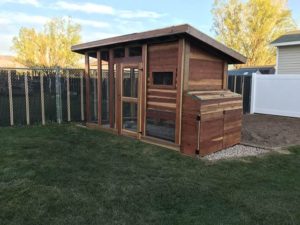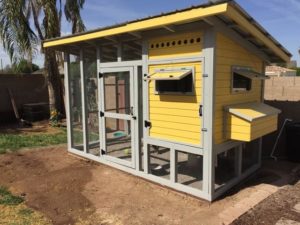If you’ve been considering investing in backyard chickens, the next step is to decide what kind of chicken coop to get. But before you run out and buy or build a hen house, there are a few things you should consider. What kind of space do you have for the coop? How many chickens do you want to keep? What kind of climate do you live in? These are just some of the questions you need to answer before building or buying a chicken coop.
In this blog post, we’ll go over some things you need to consider when looking at chicken coops. So if you’re ready to add some feathered friends to your backyard, keep reading!
What to Consider When Looking at Chicken Coops for Backyard Chickens
Here are some of the key things you’ll need to take into account.
1. Size
When it comes to chicken coops, size definitely matters. You want to make sure that your flock has plenty of room to move around, and that you have enough space to comfortably clean and maintain the coop. But how do you know what size chicken coop is right for you? Ask yourself these questions:
- How many chickens do you want to keep? This is the most important factor in determining coop size. Make sure to allow for about 4 square feet per chicken. Hens are social animals who should not be left on their own, so you should have at least two birds, and ideally five or more.
Of course, these numbers also depend on the breed of chicken you choose. If you choose a larger breed like a Rhode Island Red, you will need more room than for a small breed like a Bantam.
- Do you want your chickens to be considered free-range? If so, you’ll need a larger chicken house as well as an enclosed run.
- If your chickens have free access to an outdoor space at least ten feet long, you can have a smaller hen house with just 2 square feet per bird.
- How much space do you have in your backyard? You don’t want your chicken coop to take up too much space, so make sure to measure before you shop.
But remember that a too-small coop can cause problems in your brood, such as:
- Aggressive behavior: chickens confined to too-small areas will resort to excessive pecking and other aggressive behaviors. Having a large enough coup means they do not need to compete for resources and will get along better. If aggressive behavior starts, it can spread to the rest of the brood and cause hostile conditions.
- High ammonia levels: In a too-small coop, manure and urine will build up much faster. This causes excessive ammonia levels that threaten the air quality and the health of your chickens. Keep the floor of your coop clean and dry to prevent ammonia buildup and improve the health of your chickens.
- Reduced egg production: When hens lack enough resources, they will become stressed and fail to produce eggs at their maximum capacity.
On the other hand, a too-large coop can cause problems too:
- Takes longer to clean
- In winter, they will either be too cold or you will spend more on heating
If you’re unsure what the right size for you is, asking your farm supply store or other local experts is always a good place to start.
2. Buy or Build?
For anyone considering backyard chickens, one of the first decisions to make is whether to buy or build a chicken coop. Both options have their pros and cons, so it’s important to weigh all the factors before making a decision.
Buying Pre-Made
One of the main advantages of buying a chicken coop is that it’s a ready-made solution that can be set up quickly and easily. However, store-bought coops can be expensive, and they may not be as durable as a well-built homemade coop.
Build Your Own Chicken Coop
Building a chicken coop from scratch gives you the opportunity to customize the design to your specific needs and preferences. But it’s also a project that will likely require some tools and building materials.
We have an easy-to-build and customize chicken coop plan here! This plan is suitable for a variety of backyards and can be modified to suit your needs. Plus, if the plan isn’t for you, we’ll refund you, no questions asked.
Ultimately, there is no right or wrong answer when it comes to deciding whether to buy or build a chicken coop. It’s simply a matter of what works best for you and your backyard flock!

3. Materials
There are a variety of options available in terms of building materials. Some people prefer to use wood, while others opt for metal or plastic. Each material has its own set of advantages and disadvantages, so it’s important to choose the one that best fits your needs and budget.
Wood
Wood is a popular choice for chicken coops because it’s strong and durable. However, wood can be expensive, and it requires regular maintenance to prevent it from rotting.
Metal
Metal chicken coops are usually less expensive than wood coops, but they’re not as aesthetically pleasing.
Plastic
Plastic chicken coops are often the most affordable option, but they’re not as durable as other materials.
When choosing a material for your chicken coop, consider your budget and the level of maintenance you’re willing to do.
4. Style of Chicken Coop
There are a variety of different styles to choose from. Portable, stationary, and attached are the most common.
Portable
Portable chicken coops can be easily moved around, making them ideal for those who want the flexibility to change the location of their coop. Portable chicken coops are less expensive than stationary chicken coops, but they require more maintenance and care also may also be less sturdy.
Stationary
Stationary chicken coops, on the other hand, offer a more permanent solution. They may be more expensive up front, but they require less maintenance and are more sturdy.
Attached
Attached chicken coops are typically attached to another structure, such as a garage or shed. Attached chicken coops offer the benefit of being attached to another structure, which can provide additional protection from predators and the elements and may be more convenient for you.
Each of these styles has its own pros and cons when building chicken coops in your backyard. The style of chicken coop you choose will depend on your specific needs and preferences.
5. Location, location, location!
You’ll also want to think about where you want to place the chicken coop in your backyard.
First, you’ll want to make sure that the coop gets plenty of sunlight and fresh air. chickens benefit from being able to spend time in the sun, so a spot that gets plenty of sunlight is ideal.
You’ll also want to make sure that the coop is close enough to your house that you can easily check on your chickens, but far enough away that they won’t be too noisy.
Another thing to consider is whether or not you want your chickens to have access to a run. If so, you’ll need to make sure that the coop is close enough to the run so that they can easily get in and out.
Finally, you’ll need to think about how much shade and sun the chickens will need during the day. If they’re going to be spending most of their time in the sun, you’ll want to make sure that the coop has plenty of ventilation so that they don’t get too hot. On the other hand, if they’re going to be spending most of their time in the shade, you’ll want to make sure that there’s enough light getting into the coop!

6. Ventilation
Additionally, you’ll need to make sure the chicken coop has good ventilation to keep your feathered friends healthy and happy.
Without proper ventilation, chicken coops can quickly become stifling and unhealthy places for your birds. Ammonia from their droppings can build up and cause respiratory problems, while the lack of fresh air can lead to stagnant, humid conditions that are ideal for the growth of mold and bacteria.
Also, if you live in a cold climate, you will need a coop that is well insulated and equipped with a heat lamp.
Adequate ventilation will help to keep your coop smelling fresh and will also provide a steady supply of fresh air for your birds to breathe. It’s important to ensure that the sides and roof of your coop are well ventilated – putting some holes in the walls or installing a small fan can make a big difference.
By taking some simple steps to improve the ventilation in your chicken coop, you can help to keep your chickens relaxed and safe.
7. Protection from predators
One of the most important factors to consider is predator-proofing. After all, you want to make sure your chickens are safe from any potential harm.
There are a few different ways to do this. First, you’ll want to choose a coop that is made out of strong materials. This will help to deter predators from being able to break in.
You’ll also want to make sure the coop is properly secured. This means making sure the doors and windows are shut tight and that there are no gaps or holes that a predator could potentially squeeze through.
Finally, you’ll want to keep the coop clean and free of any food scraps or clutter. This will help to attract other animals, which could then lead to predators coming around.
By following these simple tips, you can help to ensure that your chickens are safe from harm.
8. Chicken Coop Accessories
Once you’ve decided on the size and style of the coop, you can start looking at accessories. A nesting box is a must-have for any hen, as it provides a place for her to lay her eggs.
A perch is also a good idea, as it gives the hens somewhere to roost.
A feeder and waterer are also essential, as they will provide the hens with food and water.
Of course, there are many other accessories available, but these are the essential ones.

9. Keep it clean!
Your chicken coop should be easy to clean. A chicken coop that is difficult to clean can quickly become overrun with pests and diseases, which can put your flock at risk. Regularly clean out the chicken coop to prevent pests and diseases from taking hold.
The good news is that there are a number of design features that can make a chicken coop easier to clean. For example, a chicken coop with a removable floor panel can be quickly and easily hosed down. Similarly, a chicken coop with a removable roof panel can also be easily cleaned, making it a great choice for those who want to keep their flock healthy and happy.
Summary
I know, this sounds like a lot. In short, the main things to watch out for are:
- Nesting boxes, at least 1 for every 3 hens
- Proper ventilation
- A separate food and water area
- Predator protection
- A perch/roosting bar (where the hens sleep at night)
- A pop door
An attached storage area is also great to have, and it should be easy to access so you can clean it regularly.
With these things in mind, you’ll be well on your way to finding the perfect chicken coop for your backyard flock!

Chicken Coop Plans
Pre-Built Chicken Coops
Shop Local
If you decide to buy a pre-built chicken coop, there are lots of great options for you. Having someone build a coop and deliver it to you is certainly convenient!
Often the best place to find a good quality pre-built chicken coop is your local farm supply store. The staff there are generally very knowledgeable about chicken coops and can help you find one that suits your needs. They will also have a good selection of coops to choose from, so you can compare prices and features. If you’re not sure what size coop you need, the staff at the hardware store can usually help you figure that out as well.
Another great thing about shopping at your local farm supply store is that they often offer discounts on chicken coops if you purchase other items from their store as well. So, if you’re looking for a good deal on a chicken coop, be sure to check out your local farm supply store.
Shop Online
You can also order a pre-built chicken coop online. When possible, be sure to read the reviews and compare prices before making your final decision. With a little bit of research, you’re sure to find the perfect home for your backyard hens.
Www.CutestCoops.com has some beautiful ones, as do www.thehenhousecollection.com and https://www.chickencoopcompany.com.
Build it Yourself
We recommend a DIY chicken coop plan. Why? It is highly rewarding to participate in the process and work with your hands, and it has the added bonus of being able to make any modifications to the plan you need to suit your space.
→ Check out our downloadable chicken coop plans here, and don’t forget to check out our gallery with different ways people have customized our design!
Our downloadable 32-page PDF has all the detailed plans you need including a material list, cost estimator spreadsheet, and Google SketchUp File for 3D viewing.
Over 3,300 people have purchased our plans and many have shared their gorgeous coops with us! Click here to see photos of the coops that they have built with these plans and some of the genius modifications they have made. We’ve included some photos here to show you what others have done with our plans.
We want you to find the right fit for your lifestyle, so if you’re unsatisfied with the design, we’ll refund your money- no questions asked.

Which is Cheaper?
When deciding whether to buy or build a chicken coop for backyard hens, there are a few things to consider and often one of the biggest factors to consider is cost.
Pre-made chicken coops can be quite expensive, but if you’re handy with tools, you can build your own coop for a fraction of the cost. If you have access to cheap or free lumber, then building your own coop is very affordable. Depending on your area, purchasing all of the lumber and materials is a big variable so research those costs first.
Another thing to think about is the amount of time you’re willing to spend on the project. Building a chicken coop is a fun and rewarding experience, but it will take some time and effort. If you’re short on time or not very handy, then buying may be the better option. Ultimately, the decision of whether to buy or build depends on your needs and preferences.
Conclusion
Keeping your own hens is a fantastic way to feel more connected to the environment and enjoy some nutritious home-grown food. So, whether you are just starting out with keeping backyard hens or have been at it for a while, we hope this guide has been helpful. Keep in mind that the best chicken coop plans are always flexible- so if something doesn’t work for your space or needs, feel free to adapt it.
If you’re feeling inspired to get started on your own chicken coop, be sure to check out our detailed hen house plans. And if you have any questions along the way, don’t hesitate to reach out for help. We would love to see more people getting back to basics and enjoying fresh eggs right from their backyard. And as always, happy hen keeping!



Recent Comments